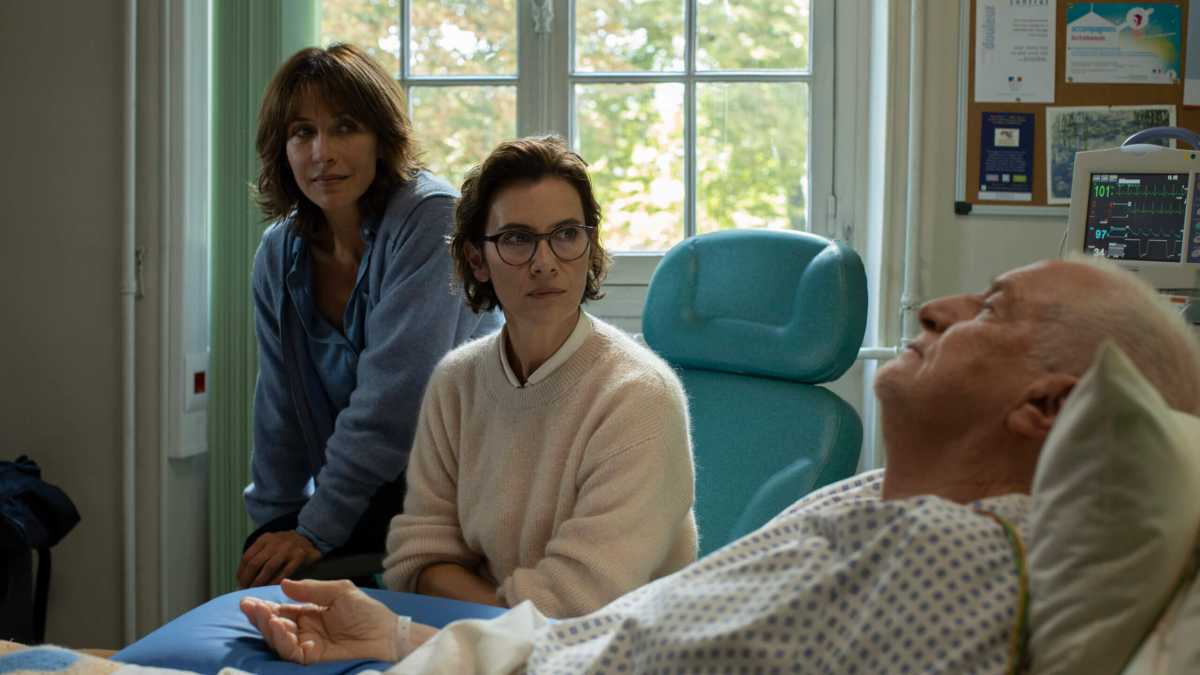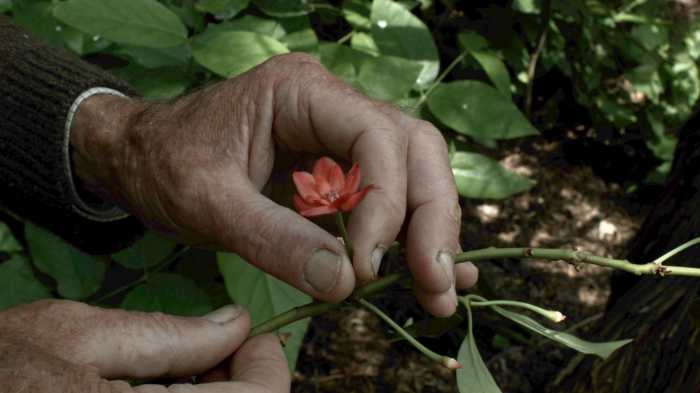Out gay filmmaker François Ozon tackles the sensitive topic of assisted suicide in his gripping drama, “Everything Went Fine.” The film, made in 2021 but being released now, is based on Emmanuèle Bernheim’s memoir. (The late Bernheim had collaborated with Ozon on several of his films, including “Under the Sand,” “Swimming Pool,” “Five Times Two,” and “Ricky.”)
The film opens with Emmanuèle (Sophie Marceau) getting a call that her octogenarian father André (André Dussollier) has had a stroke. She meets her sister Pascale (Géraldine Pailhas) and they come to understand more about his situation, his treatments, and what to expect from the hospital staff. It is, of course, devastating as well as frustrating to see their father, a once vibrant man, reduced to an almost infantile capacity.
Ozon handles these scenes with efficiency, but also allows for emotion. Emmanuèle gets sentimental about a sandwich she gives to her father — he takes a bite out of it, she saves it. She also starts to reflect on her childhood and her prickly relationship with her father. These flashbacks consist of only a few scenes, and while they reveal something about André’s stubborn character, Ozon could have included more “memories.”
Emmanuèle’s internal conflict goes into overdrive when André tells her, “I want you to help me end it.” Emmanuèle is struck by this request — made to her, not Pascale — and struggles with honoring it. Both Emmanuèle and Pascale are resigned to what will likely transpire, and they grudgingly respect André’s wishes even if it is not what they want for him, or them. They also understand their father will not be denied.
“Everything Went Fine” deftly chronicles how the sisters respond to André’s death wish and the film thankfully spares didactic morality lessons and debate. Emmanuèle researches the legality of assisted suicide, which is not possible in France, but available in Switzerland. They meet with a lawyer who guides her and arranges for power of attorney and other legal matters, such as shooting a video of André clearly expressing his wishes. When Emmanuèle meets with a Swiss contact (Hanna Schygulla) she sets a plan in motion even as she wishes her determined father will change his mind.
Ozon allows the drama to unfold with very little sturm und drang about death. There are few scenes featuring Emmanuèle and Pascale’s long-depressed mother, Claude (Charlotte Rampling), who seems unmoved by this decision. Several episodes involve Gérard (Grégory Gadebois), a man, it is implied, who has been having a sexual relationship with André — but André is not keen on seeing him presently. Gérard makes a nuisance of himself for the sisters — they nickname him “shithead” — as he insists on seeing André if only, perhaps, to secure an expensive watch he was promised. When André later meets with his cousins, Emmanuèle and Pascal are upset to discover lies André told them. Moreover, André telling everyone about his plans for voluntary death potentially jeopardizes his trip to Switzerland and could send his daughters to jail. A sequence late in the film creates suspense and comedy as the plans are discovered by the authorities. This episode feels like the film’s only misstep as the points being made here about right to die ethics and the disabled are clunky.
Emmanuèle and Pascale are certainly distraught about André’s desires, but they also recognize — as he does —that his life will never quite be “normal” again. He wants to make peace before he passes and watching Emmanuèle, in particular, accept that hard truth is very moving.
Sophie Marceau gives a very empathetic performance as a woman who tries to keep her father stable while she herself is free-falling. Marceau conveys her masked emotions well as she operates on her father’s behalf — caring for him when he needs attention after having soiled his bed in the hospital, or covering for him when his friends ask after him. But she expresses her vulnerability when André is irascible towards Emmanuèle when she returns from a few days of self-care or does not adhere to his wishes. She also feels deeply when he asks to have a fancy lunch at a favorite restaurant in the days before his voluntary death. A scene of her excusing herself to cry in the bathroom is quite touching.
André Dussollier delivers a notable performance as André suffers indignities and experiences pleasures. The veteran actor is incredibly expressive given André’s limitations.
“Everything Went Fine” allows viewers to share Emmanuèle’s pain, which is what makes it so engrossing, but Ozon shrewdly does not jerk tears. He deliberately keeps the drama from becoming maudlin. As Pascale has moments where she feels grief about the situation, as when she is seen in a shower, the film lets viewers sit with the character and absorb her emotions. Herein lies the poignancy of Ozon’s film. He uses Emmanuèle’s experiences to gently guide, not lecture, viewers through the issues at hand, which is why the message resonates.
“Everything Went Fine” | Directed by François Ozon | Opening April 14 at the Quad Cinema | Distributed by Cohen Media Group.



































